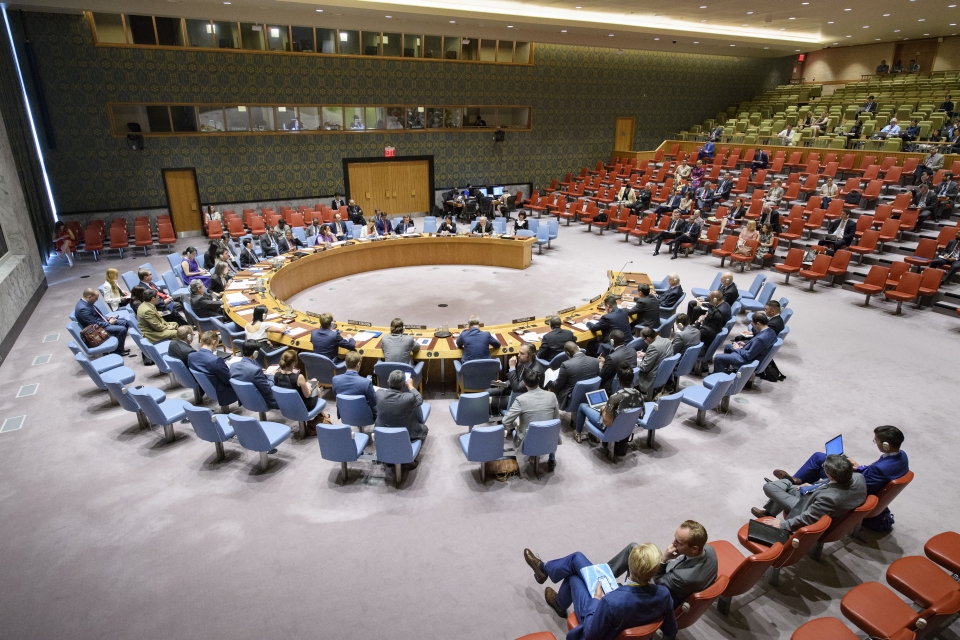Calling for peace, security and justice in Bosnia
Statement by Stephen Hickey, UK Political Coordinator the UN, at the Security Council briefing on Bosnia and Herzegovina

Thank you, Mr President. Let me begin by thanking the High Representative for his very objective and detailed report and for all the efforts that he has made and his team have made to support peace and security in Bosnia. You continue to have our full support.
I’d also like to echo the tribute that you made to Lord Ashdown who played a vital role in galvanising international action during the conflicts that followed the breakup of the former Yugoslavia. We won’t forget his personal contribution to the stability and security of the region.
Mr President, I think the High Representative brought out very clearly for us, in his briefing, the major challenges with regard to the rule of law, the backsliding against different commitments and also the many risks to Bosnia’s future. And I think that your briefing really brought home to us the need for the Council to remain very focussed on the situation in Bosnia and also the continuing importance of your role and the role of the Office of the High Representative, which remains the final authority regarding the civilian implementation of the peace agreement. And this includes our support, the UK support, for the use of the Bonn Powers - if the situation requires - as well as continuing support for the EUFOR mission and its executive mandate. You have our full support.
Mr President, the last time we met to discuss this issue, elections had just taken place. However, seven months later, the process of government formation is still not complete. While we welcome the swift progress made in the Republika Srpska, we share the disappointment of South Africa and Cote d’Ivoire, in that it’s very disappointing that the state-level Council of Ministers, the Federation entity Government and four of the ten cantonal Governments have not yet been appointed. And we also urge political leaders to engage constructively on government formation at all levels, so they can begin to implement reforms that benefit all of their citizens.
Again, when we last met, many Council members - including the United Kingdom - urged those in positions of responsibility to refrain from spreading divisive sentiments and to act in the interests of all citizens. It’s again extremely disappointing that the divisive nationalist rhetoric, which dominated the election period, has persisted. As the High Representative indicated, such divisive nationalist rhetoric makes politics difficult and compromise elusive. It doesn’t serve the citizens that they are elected to represent, nor does it encourage the peace and stability we’ve all hoped for, for so many years. It is particularly concerning that some authority figures have attempted to use their position to undermine state institutions and intimidate Bosnian citizens, such as through announced changes to the Republika Srpska Criminal Code, which again, you highlighted in your report.
We fully support the Peace Implementation Council steering board’s commitment to Bosnia and Herzegovina’s fundamental structure as a single sovereign state composed of two entities. This spread of nationalistic sentiment is indicative of the wider political environment in which the democratic sphere is gradually being eroded. Laws on public assembly fall short of international standards across Bosnia and so recent moves to make these even more restrictive in the Republika Srpska were particularly alarming. Freedom of expression, peaceful assembly and freedom of the media are fundamental elements of a healthy functional democracy. Unnecessary and antagonistic legislative changes only serve to undermine democracy and move Bosnia further away from the international standards and democratic norms it needs to meet in order to progress.
Mr President, the United Kingdom welcomes the progress made, including the appeals judgment of the International Residual Mechanism for Criminal Tribunals on the case of Radovan Karadzic. This judgment is an important result for international justice, sending a powerful message that those who carry out atrocities will be held accountable for their actions and sentenced accordingly. Therefore, it’s simply appalling that political leaders and sections of society continue to deny not only the judgments of the ICTY and the IRMCT, but also the genocide in Srebrenica, despite the conclusive finding of genocide by both international tribunals and national courts. It is deplorable that political actors are willing to put their political pursuits ahead of justice for victims and for peace for all.
We also commend the submission of the answers to the follow-up questions to the European Commission questionnaire. And we welcome the public commitment of the presidency of Bosnia and Herzegovina’s European path as declared in a joint statement in December. Bosnia must now demonstrate its commitment to European-Atlantic integration, including to the rule of law, democracy and human rights. To ensure this is successful, the implementation of difficult but essential reforms are necessary. As are efforts on socio-economic reforms, which provide more opportunities for the citizens of Bosnia and therefore help to stem the flow of people leaving in search of a more prosperous and stable future elsewhere.
Mr President, although there has been some progress, as I’ve just mentioned, towards long term peace and prosperity for Bosnia, there is clearly still a very long way to go. I think, therefore, it would be useful for this Council to hear further from the High Representative about what more could we do and what more could the international community do to enhance the rule of law in Bosnia and to encourage reconciliation? We look forward to hearing from you.
Thank you very much.